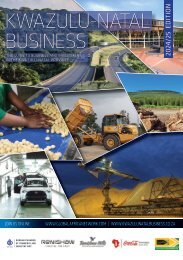Limpopo Business 2017-18 edition
A unique guide to business and investment in Limpopo. Limpopo Business 2017/18 is the ninth edition of this highly successful publication that has, since its launch in 2007, established itself as the premier business and investment guide to the Limpopo Province. This edition of Limpopo Business is officially endorsed by the Office of the Premier of Limpopo. This book contains detailed insights into the plans of the Limpopo Economic Development Agency (LEDA) and the recently launched bus rapid transport system for the provincial capital, Leeto la Polokwane, together with a comprehensive register of all provincial government and municipal contact details. Investment news related to mining, telecommunications and tourism is carried in overviews of all the main economic sectors. To complement the extensive distribution of the print edition of the magazine, the publication is also available online at www.limpopobusiness.co.za.
A unique guide to business and investment in Limpopo.
Limpopo Business 2017/18 is the ninth edition of this highly successful publication that has, since its launch in 2007, established itself as the premier business and investment guide to the Limpopo Province. This edition of Limpopo Business is officially endorsed by the Office of the Premier of Limpopo.
This book contains detailed insights into the plans of the Limpopo Economic Development Agency (LEDA) and the recently launched bus rapid transport system for the provincial capital, Leeto la Polokwane, together with a comprehensive register of all provincial government and municipal contact details. Investment news related to mining, telecommunications and tourism is carried in overviews of all the main economic sectors.
To complement the extensive distribution of the print edition of the magazine, the publication is also available online at www.limpopobusiness.co.za.
You also want an ePaper? Increase the reach of your titles
YUMPU automatically turns print PDFs into web optimized ePapers that Google loves.
<strong>Limpopo</strong> Connexion<br />
Transitioning from a resource-based economy to a<br />
knowledge economy.<br />
FOCUS<br />
<strong>Limpopo</strong> Province is taking active steps to develop its information<br />
and communications technology (ICT) sector to the point<br />
where it can take the provincial economy to a higher level<br />
and improve the delivery of government services.<br />
The agency charged with achieving these aims is <strong>Limpopo</strong><br />
Connexion. Baldwin Ramosobane, Acting CEO: <strong>Limpopo</strong> Connexion,<br />
gives the broad aims of the agency in these terms: “A key measure is<br />
to say how would <strong>Limpopo</strong> Connexion transform <strong>Limpopo</strong> from a<br />
resource-based province to a knowledge-based province.”<br />
The Knowledge Economy refers to the use of knowledge to produce<br />
economic benefits through tangible and intangible assets. The concept<br />
refers to the manner in which various high-technology businesses,<br />
especially computer software, telecommunications and virtual services,<br />
as well as educational and research institutions, could contribute<br />
to a country's economy. Creating a strong and innovative ICT sector is<br />
a vital step on the way to establishing a knowledge-based economy.<br />
World leaders are increasingly adapting to the fact that a Fourth<br />
Industrial Revolution is under way. The first was powered by<br />
water and steam, the second used<br />
electricity and introduced mass<br />
production and the third revolution<br />
in the global economy related<br />
to automation, electronics and<br />
computers. Now a Fourth Industrial<br />
Revolution is combining a range of<br />
scientific breakthroughs at great<br />
speed: central to the concept is<br />
connectivity and access to data.<br />
This new economy is creating<br />
new jobs and creating the potential<br />
for jobs in the future in sectors<br />
that don’t yet exist. Only by having<br />
a strong and adaptable communications<br />
and data network can a<br />
regional economy take advantage<br />
of these changes as they occur.<br />
31<br />
LIMPOPO BUSINESS <strong>2017</strong>/<strong>18</strong>


















